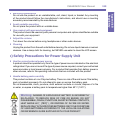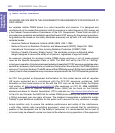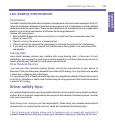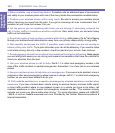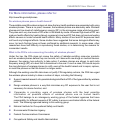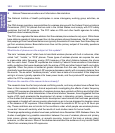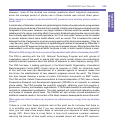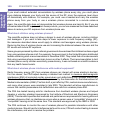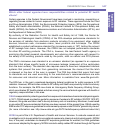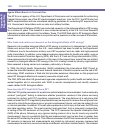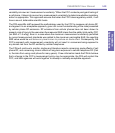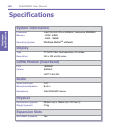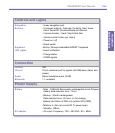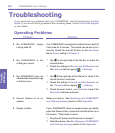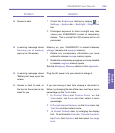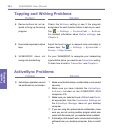
Appendix B
Regulatory
XV6600WOC User Manual146
Appendix B
Regulatory
XV6600WOC User Manual 147
Which other federal agencies have responsibilities related to potential RF health
effects?
Certain agencies in the Federal Government have been involved in monitoring, researching or
regulating issues related to human exposure to RF radiation. These agencies include the Food
and Drug Administration (FDA), the Environmental Protection Agency (EPA), the Occupational
Safety and Health Administration (OSHA), the National Institute for Occupational Safety and
Health (NIOSH), the National Telecommunications and Information Administration (NTIA), and
the Department of Defense (DOD).
By authority of the Radiation Control for Health and Safety Act of 1968, the Center for
Devices and Radiological Health (CDRH) of the FDA develops performance standards for
the emission of radiation from electronic products including X-ray equipment, other medical
devices, television sets, microwave ovens, laser products and sunlamps. The CDRH
established a product performance standard for microwave ovens in 1971 limiting the amount
of RF leakage from ovens. However, the CDRH has not adopted performance standards
for other RF-emitting products. The FDA is, however, the lead federal health agency in
monitoring the latest research developments and advising other agencies with respect to
the safety of RF-emitting products used by the public, such as cellular and PCS phones.
The FDA's microwave oven standard is an emission standard (as opposed to an exposure
standard) that allows specic levels of microwave leakage (measured at ve centimeters
from the oven surface). The standard also requires ovens to have two independent interlock
systems that prevent the oven from generating microwaves the moment that the latch
is released or the door of the oven is opened. The FDA has stated that ovens that meet
its standards and are used according to the manufacturer's recommendations are safe
for consumer and industrial use. More information is available from: www.fda.gov/cdrh.
The EPA has, in the past, considered developing federal guidelines for public exposure to RF
radiation. However, EPA activities related to RF safety and health are presently limited to advisory
functions. For example, the EPA now chairs an Inter-agency Radio frequency Working Group,
which coordinates RF health-related activities among the various federal agencies with health or
regulatory responsibilities in this area.
OSHA is responsible for protecting workers from exposure to hazardous chemical and physical agents.
In 1971, OSHA issued a protection guide for exposure of workers to RF radiation [29 CFR 1910.97].
However, this guide was later ruled to be only advisory and not mandatory. Moreover, it was based
on an earlier RF exposure standard that has now been revised. At the present time, OSHA uses the
IEEE and/or FCC exposure guidelines for enforcement purposes under OSHA's "general duty clause"
(for more information see: http://www.osha-slc.gov/SLTC/radiofrequencyradiation/index.html)
NIOSH is part of the U.S. Department of Health and Human Services. It conducts research and
investigations into issues related to occupational exposure to chemical and physical agents. NIOSH
has, in the past, undertaken to develop RF exposure guidelines for workers, but nal guidelines
were never adopted by the agency. NIOSH conducts safety-related RF studies through its Physical



